This Dharma ritual originated in the Liang Dynasty (AD502-549) when Emperor Wu had a dream in which a spiritual Sangha told him, “The sentient beings of the Four Forms of Birth and Six Paths undergo measureless sufferings, and there would be no greater relief than holding the Water and Land Grand Offering Service to save them.“ Thereupon the Emperor decreed that a group of Venerable monks, led by State Master Baozhi, compose the scripture through an extensive investigation of the Buddhist Sutras. Three years later, upon completing the composition, Emperor Wu prayed to the Three Treasures and declared that if the ritual is in accord with the essence of the Buddhadharma and both sagely and ordinary beings would benefit from it, all the candles would alight of their own accord; otherwise they would stay dark. The Emperor bowed after his prayer and the lamps illuminated upon his first bow. Upon the second bow the palace rumbled, followed by a heavenly rain of flowers which fell upon the third, thus proving the ritual’s significant religious efficacy.
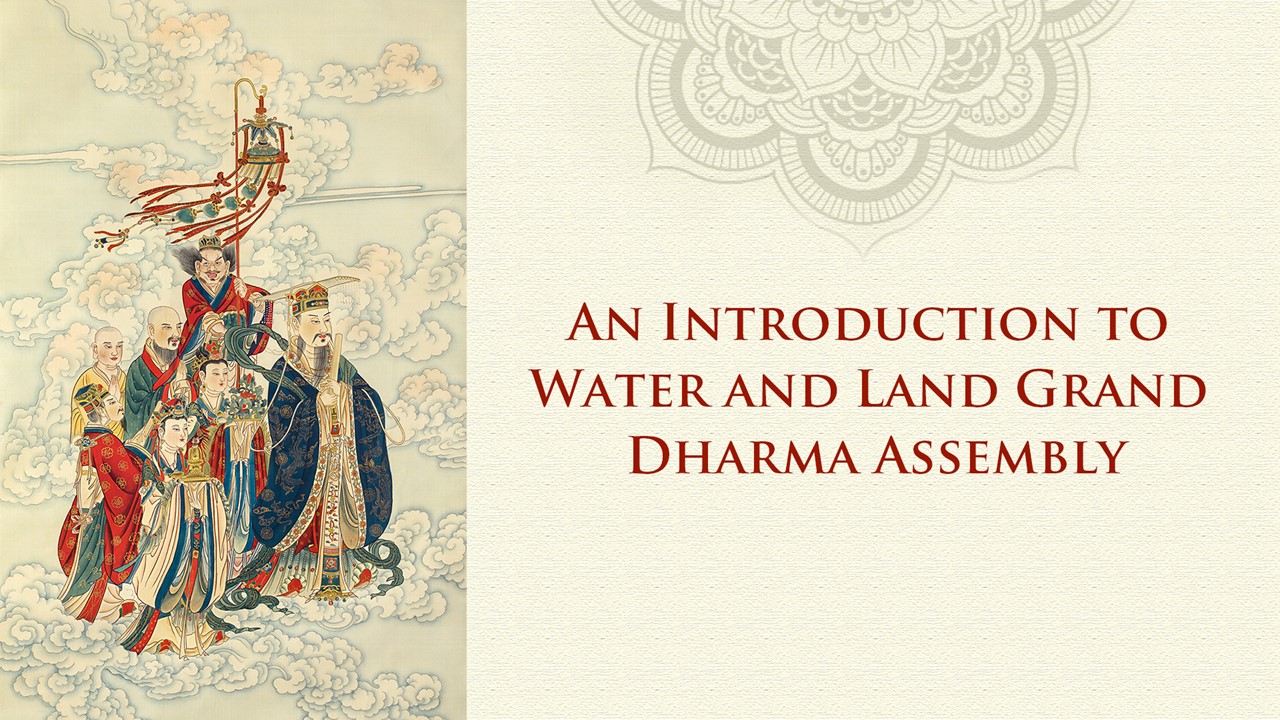
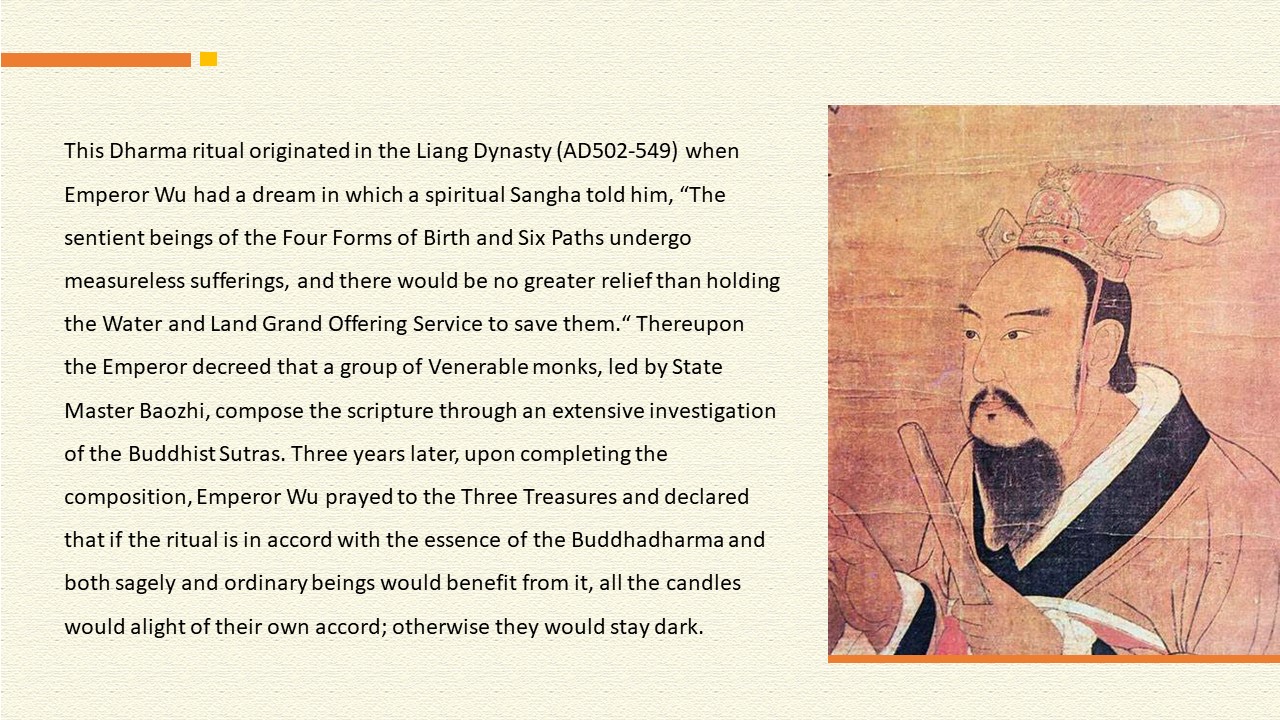
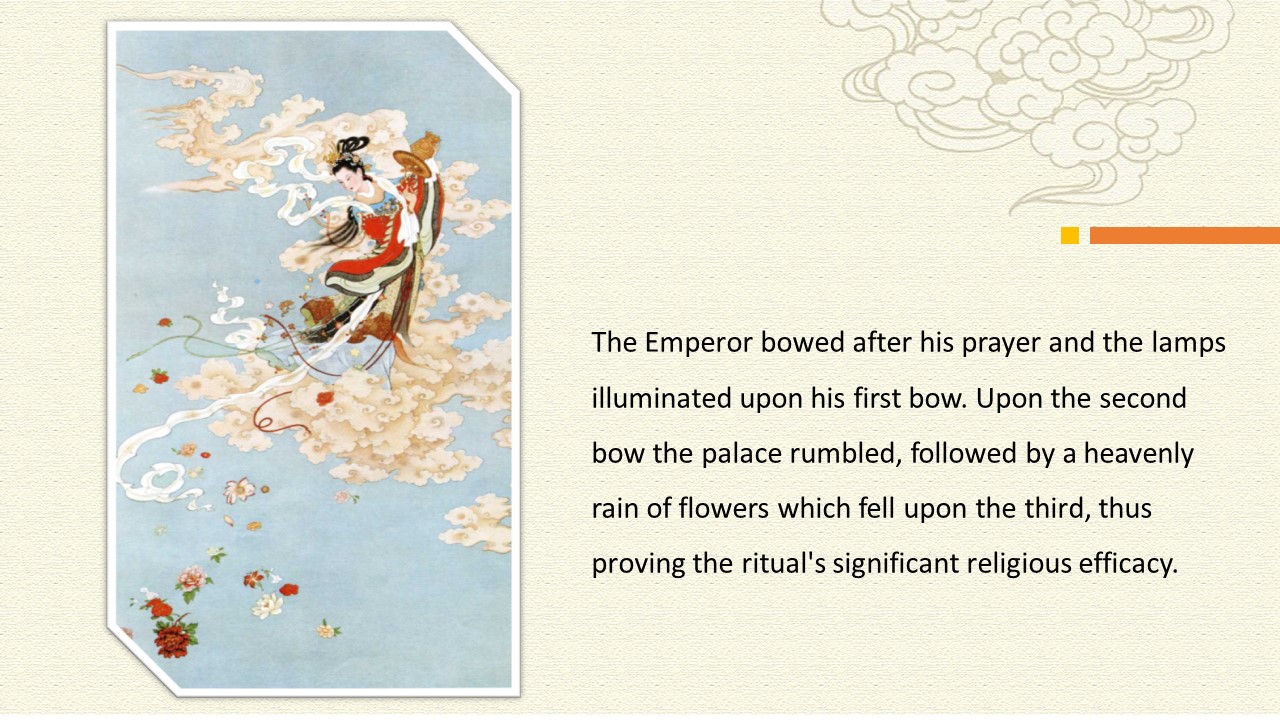
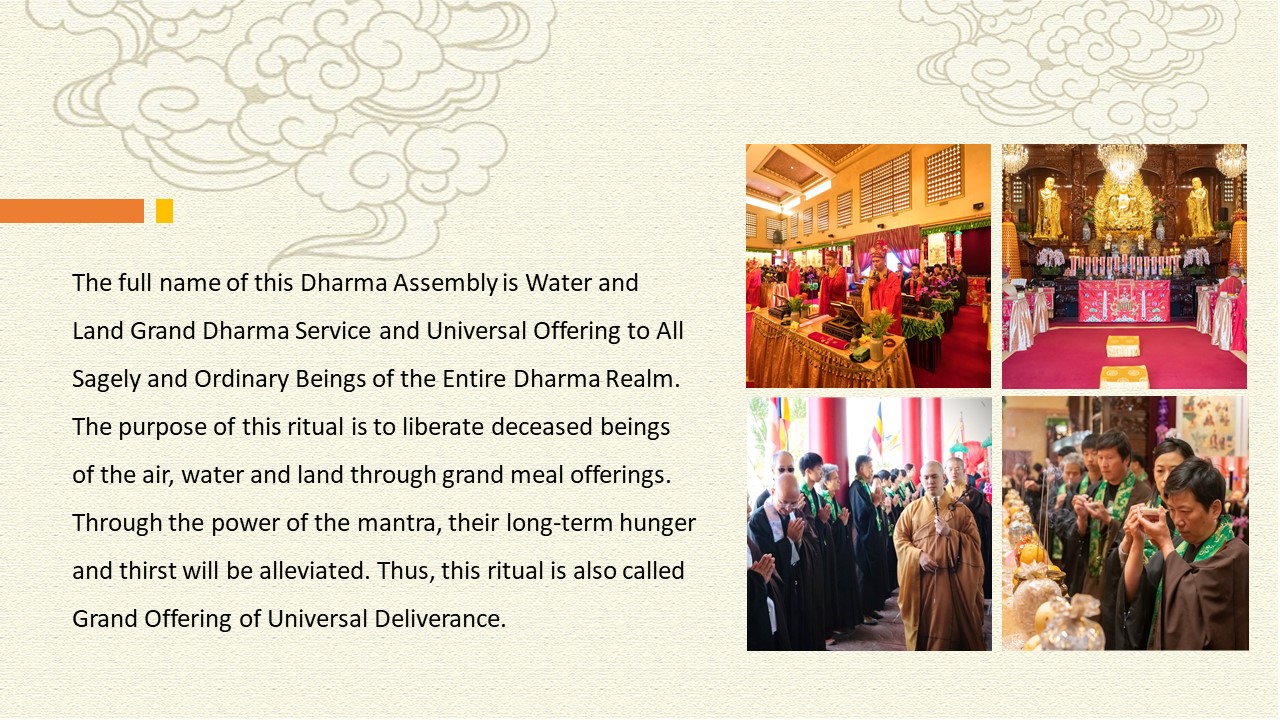
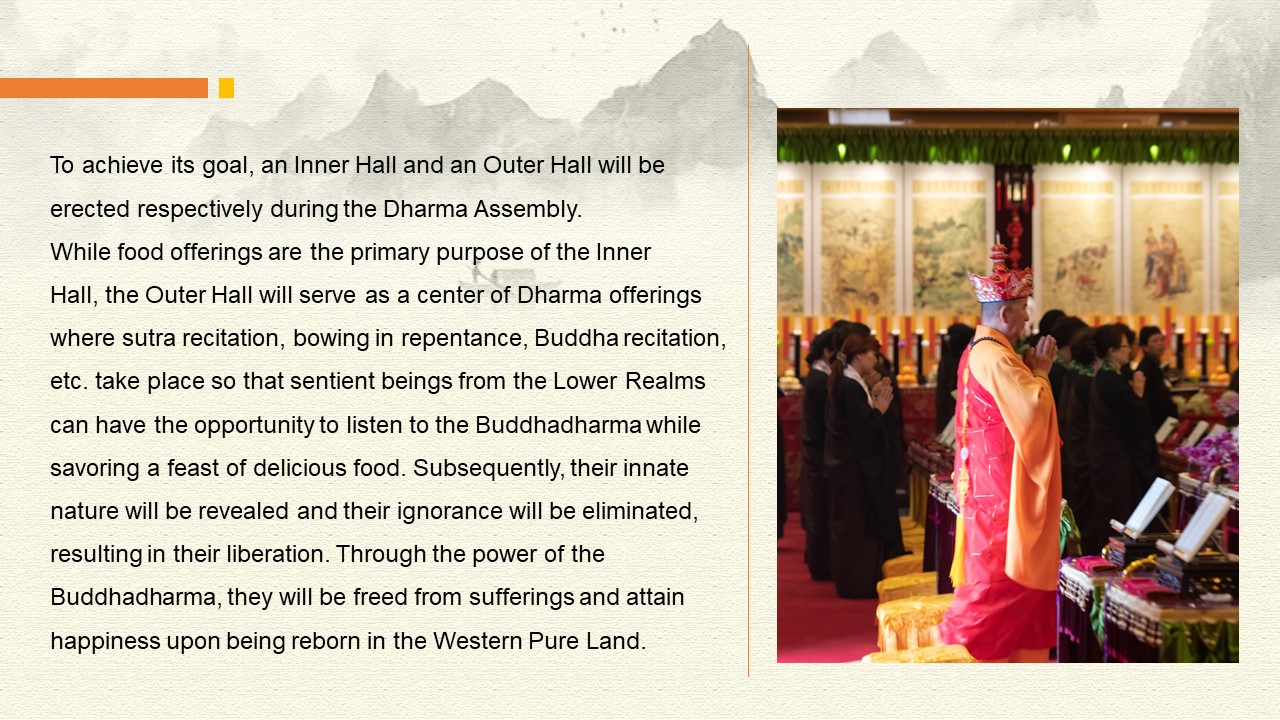
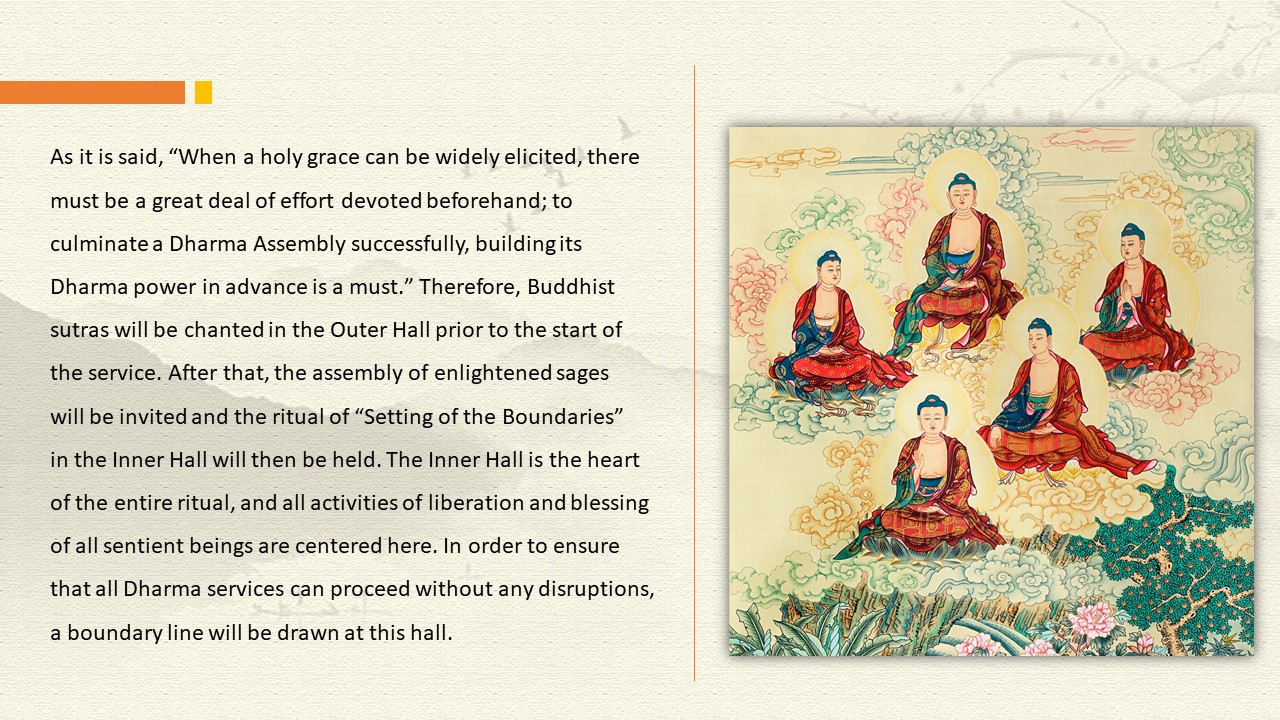
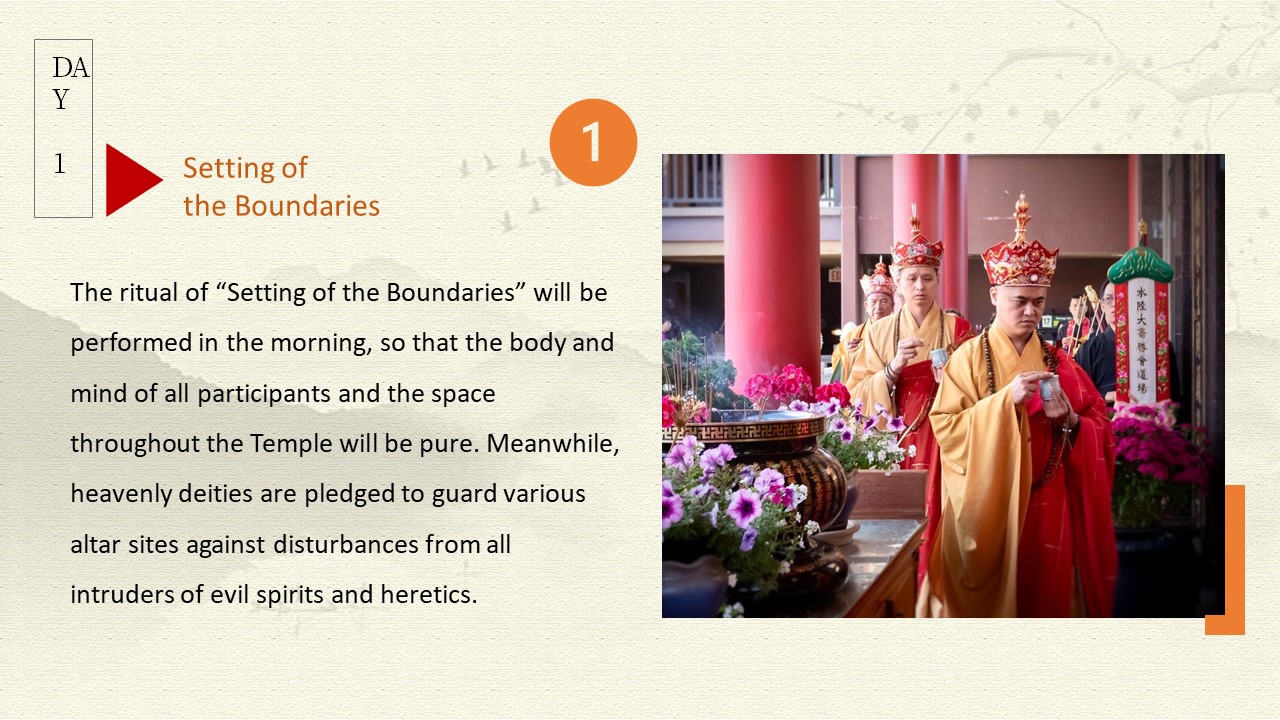
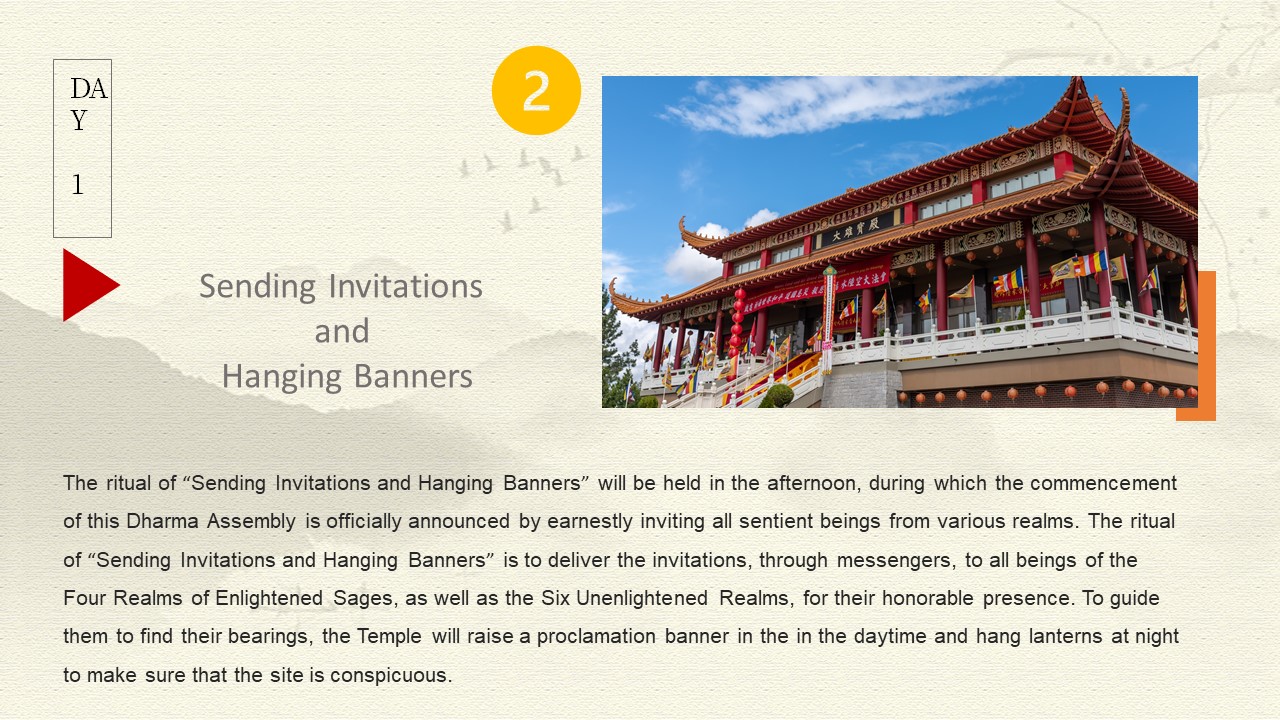
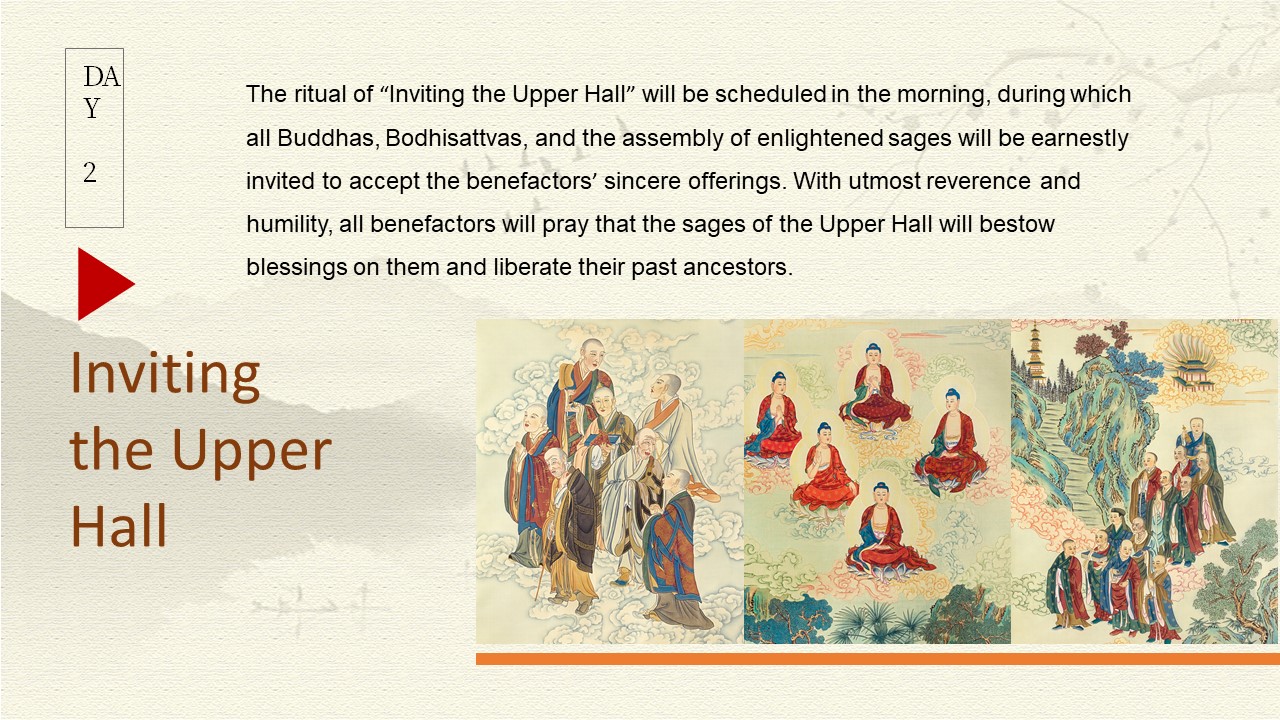
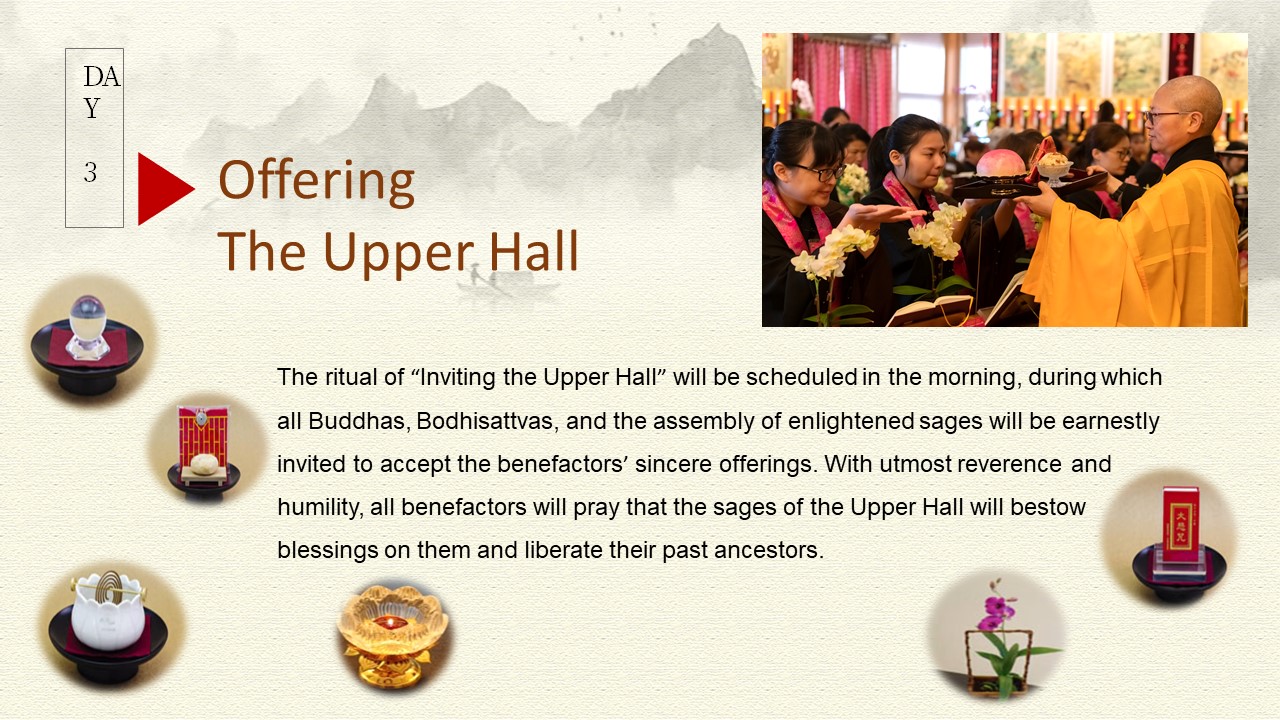
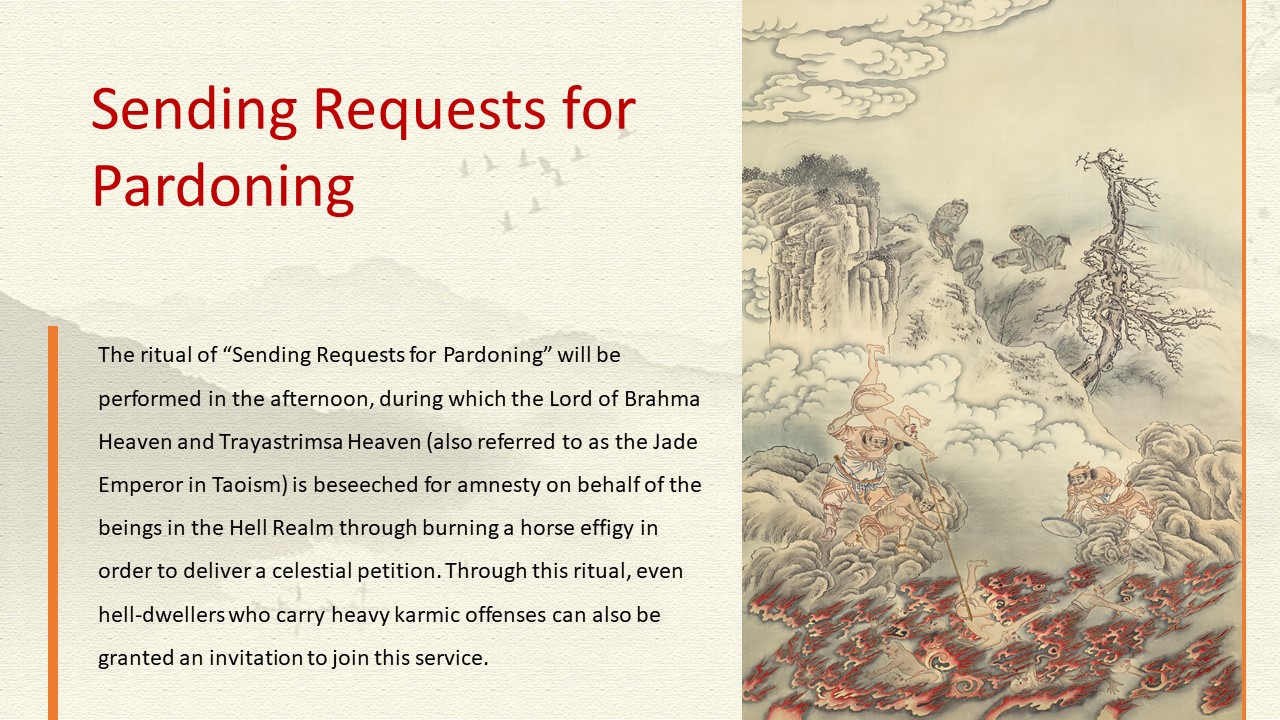
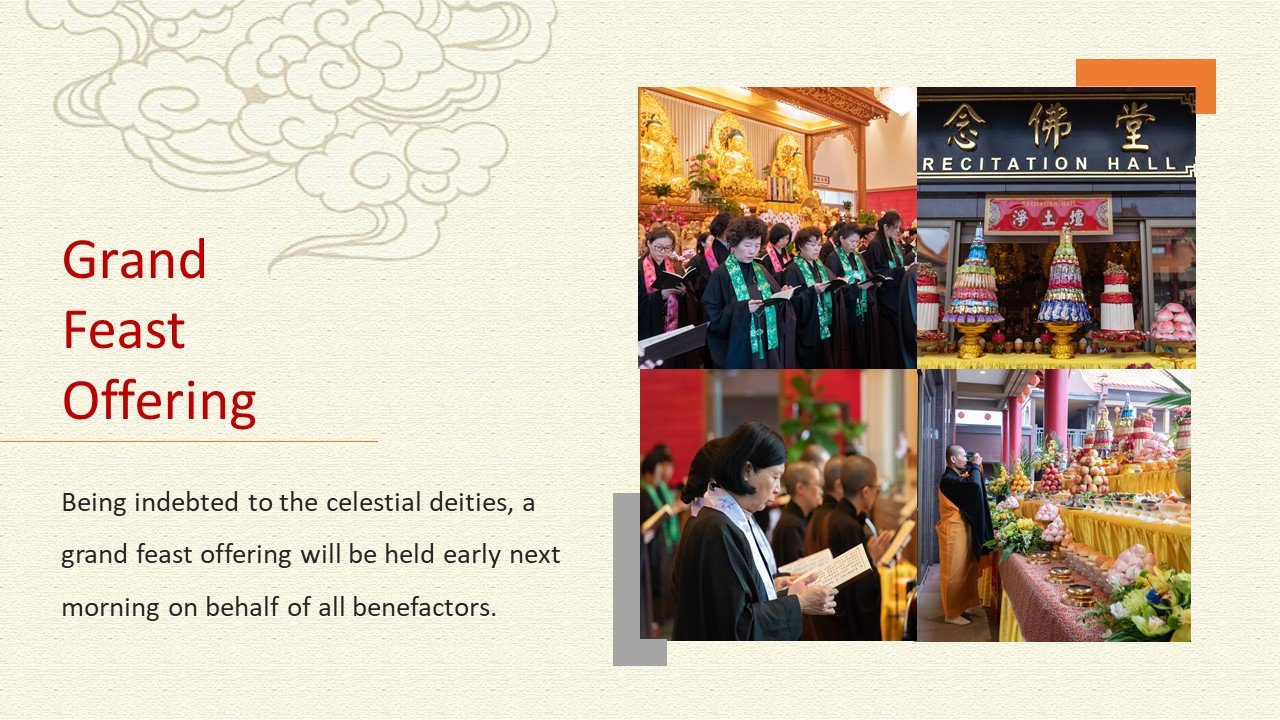
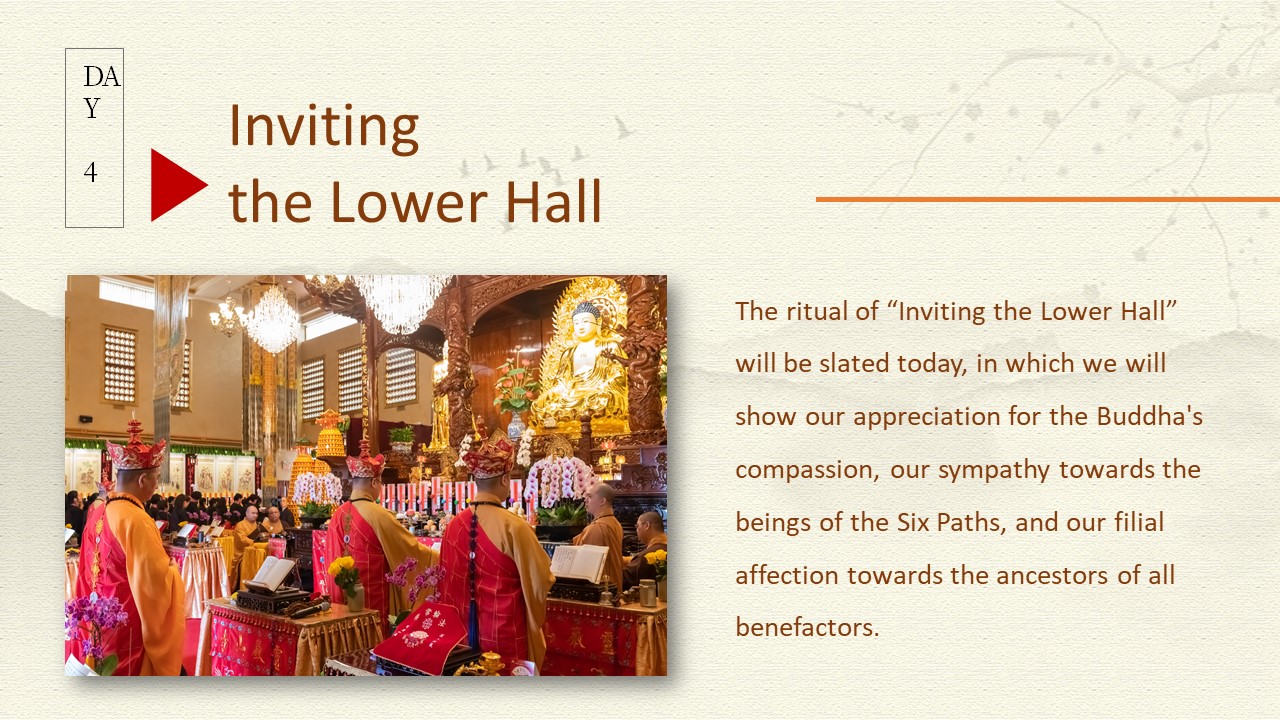
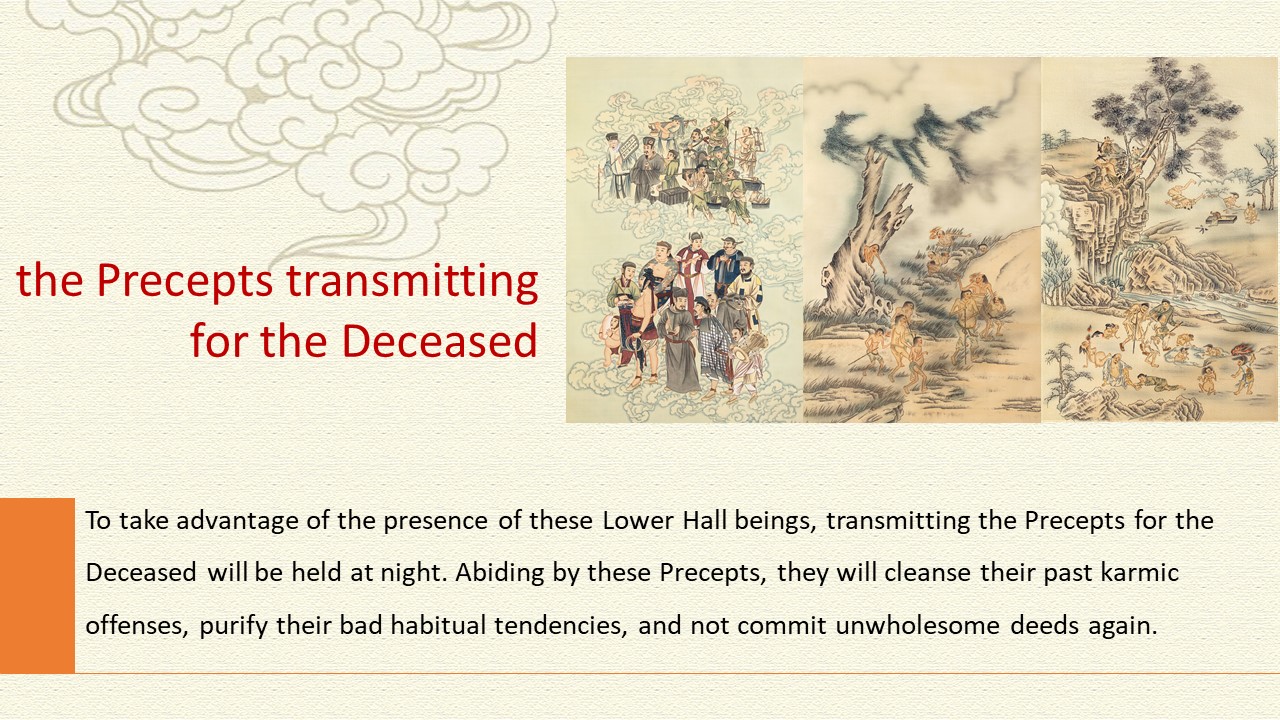
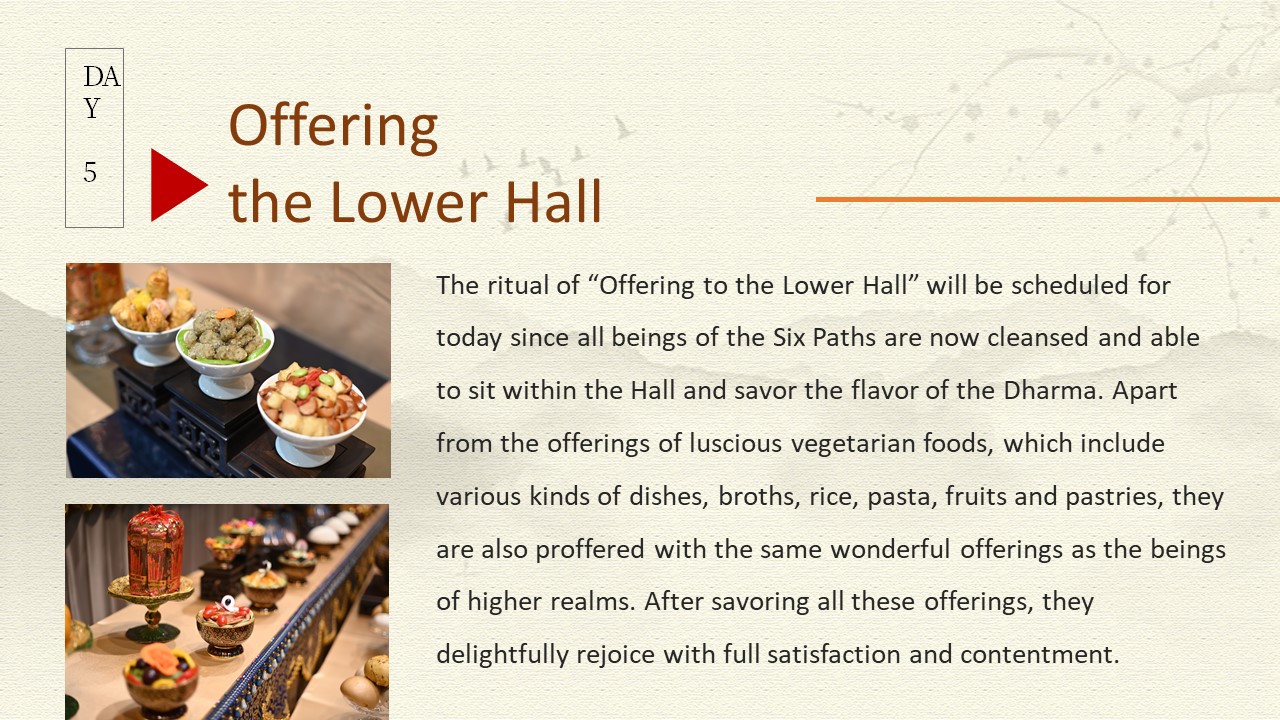
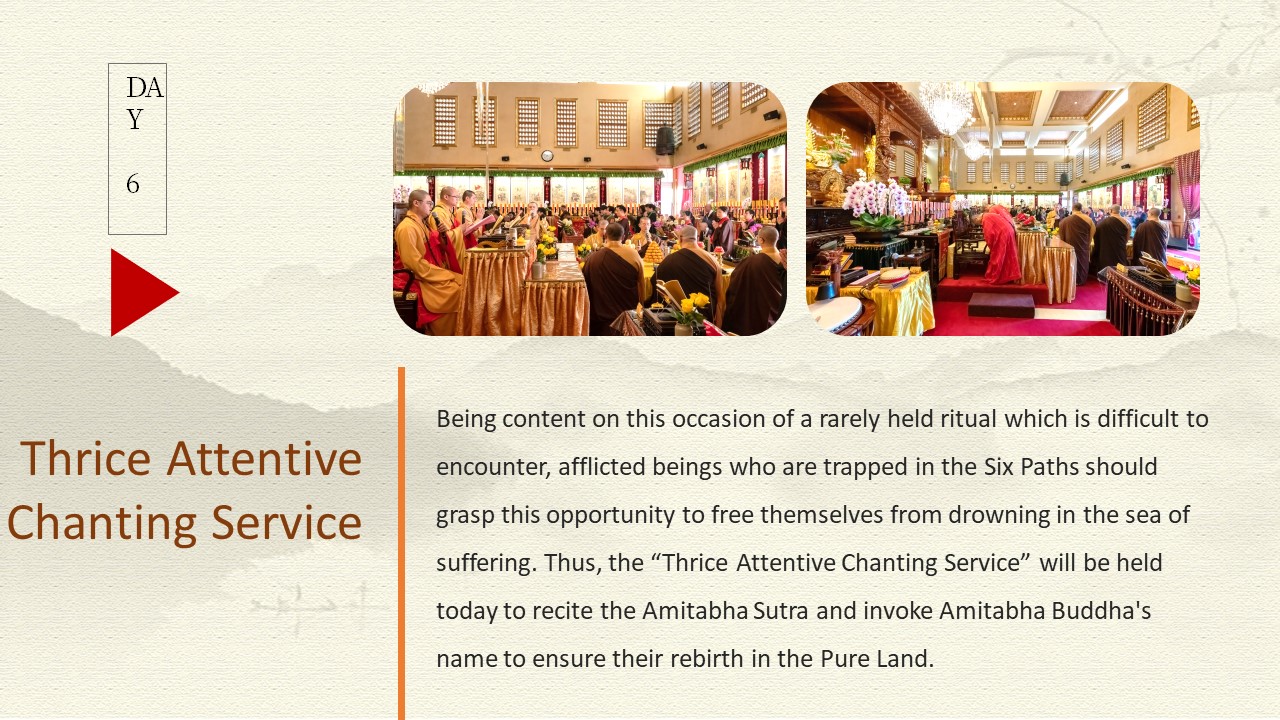
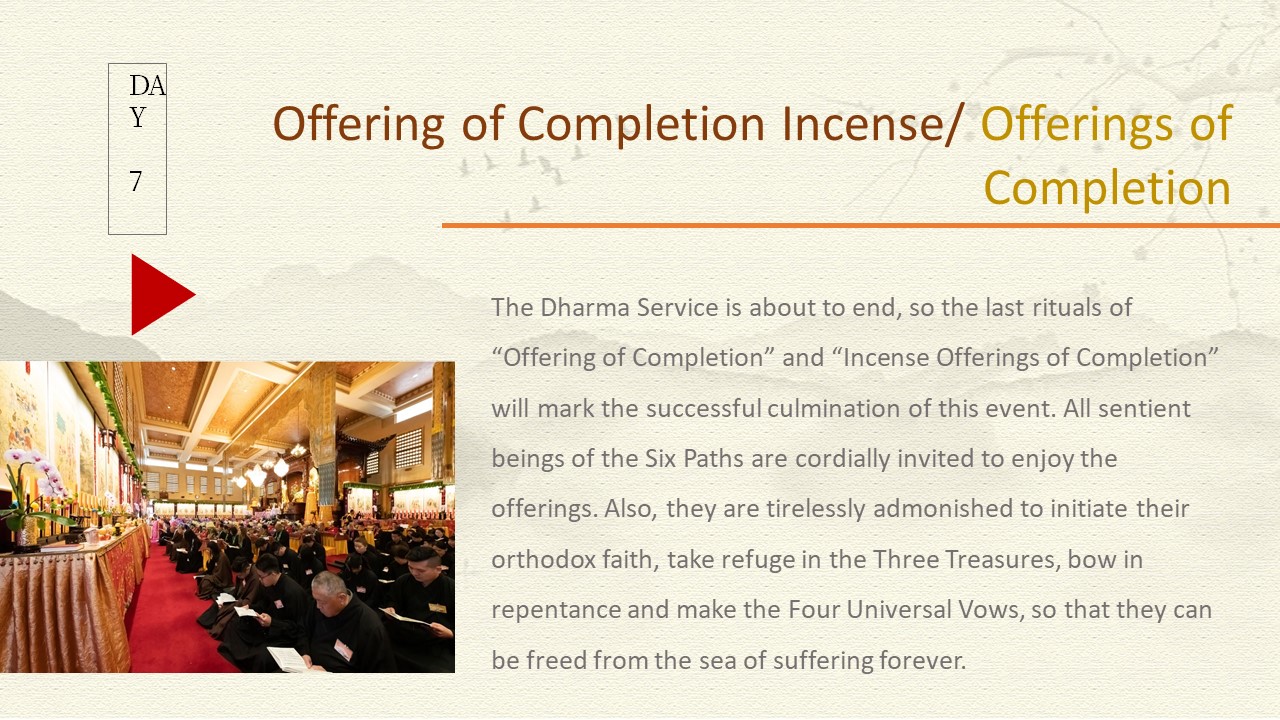
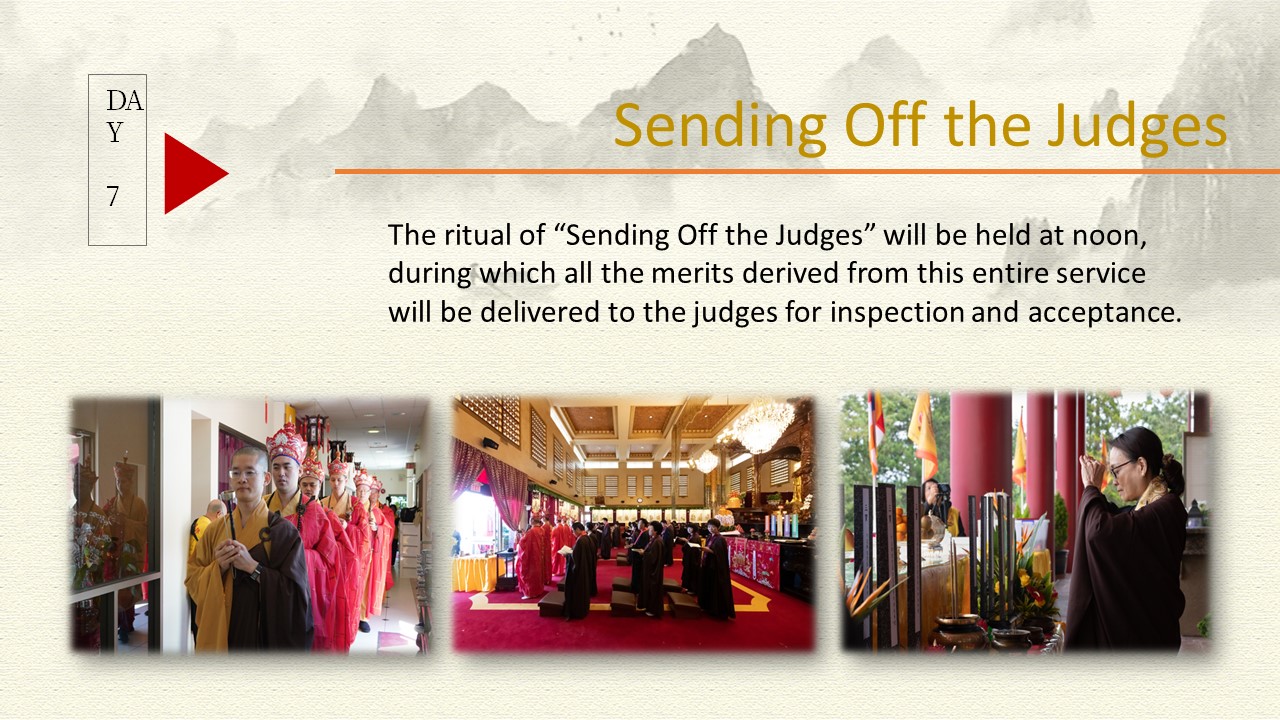
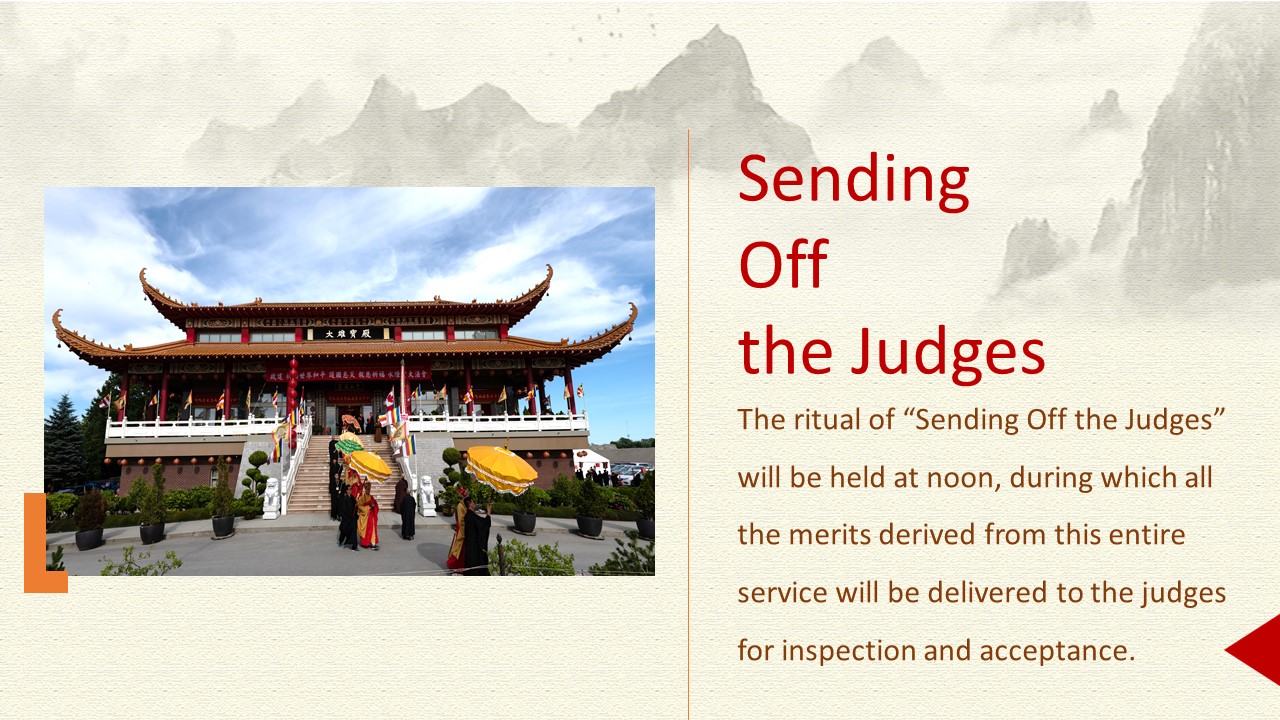
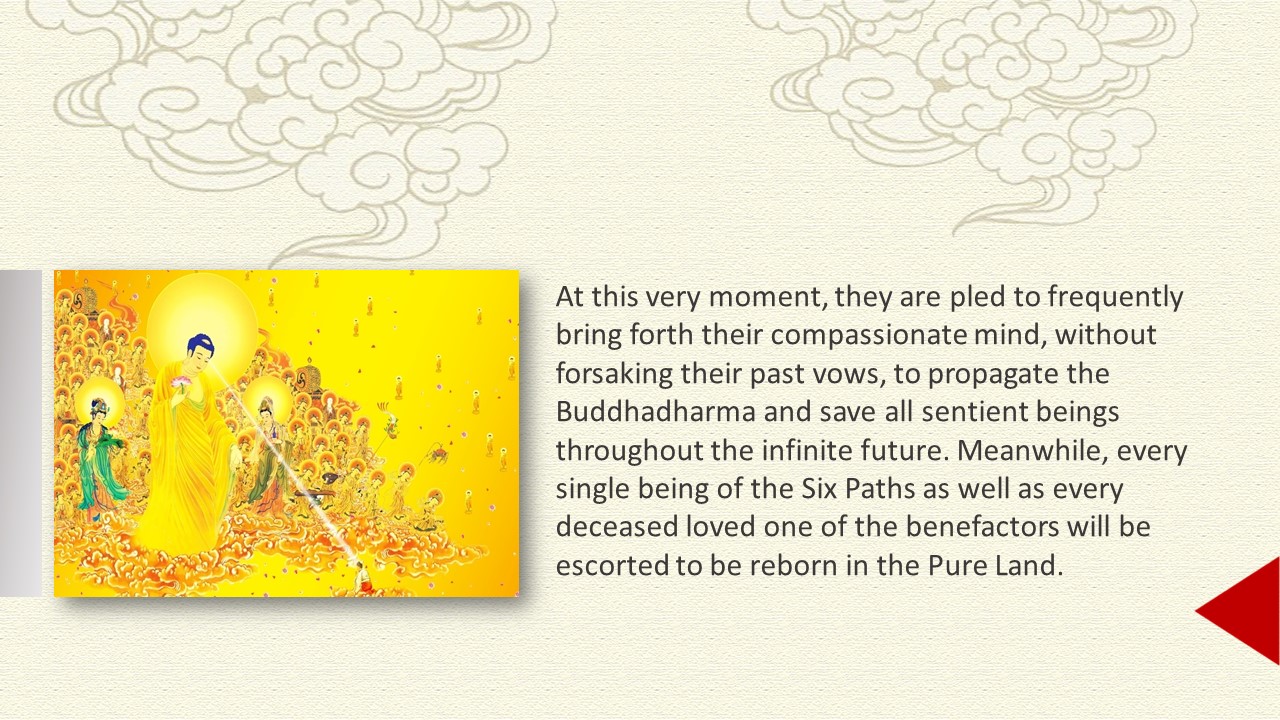
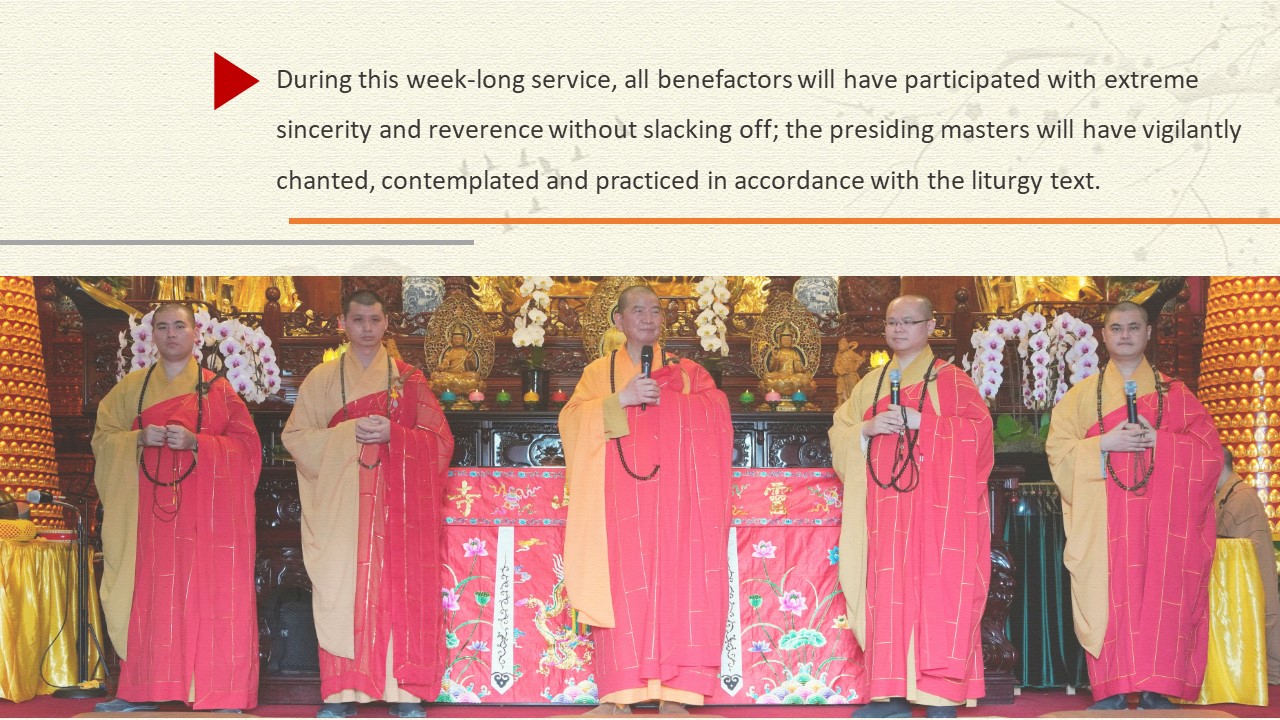
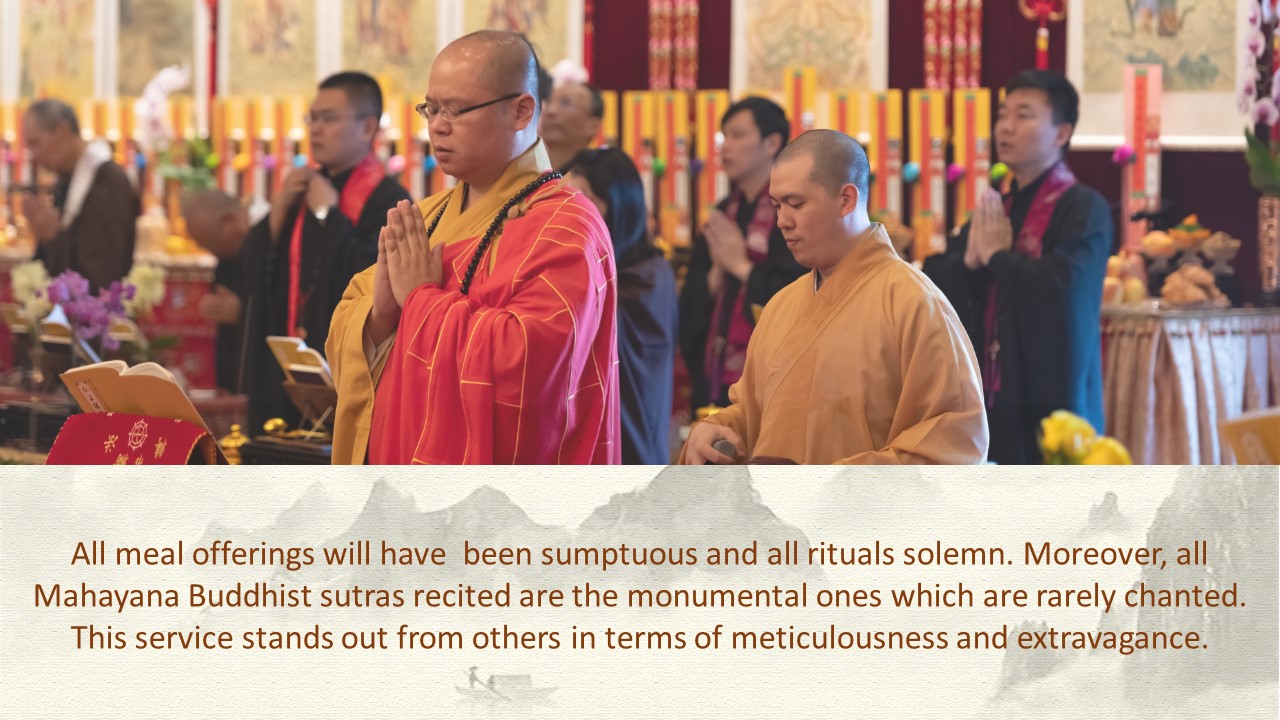
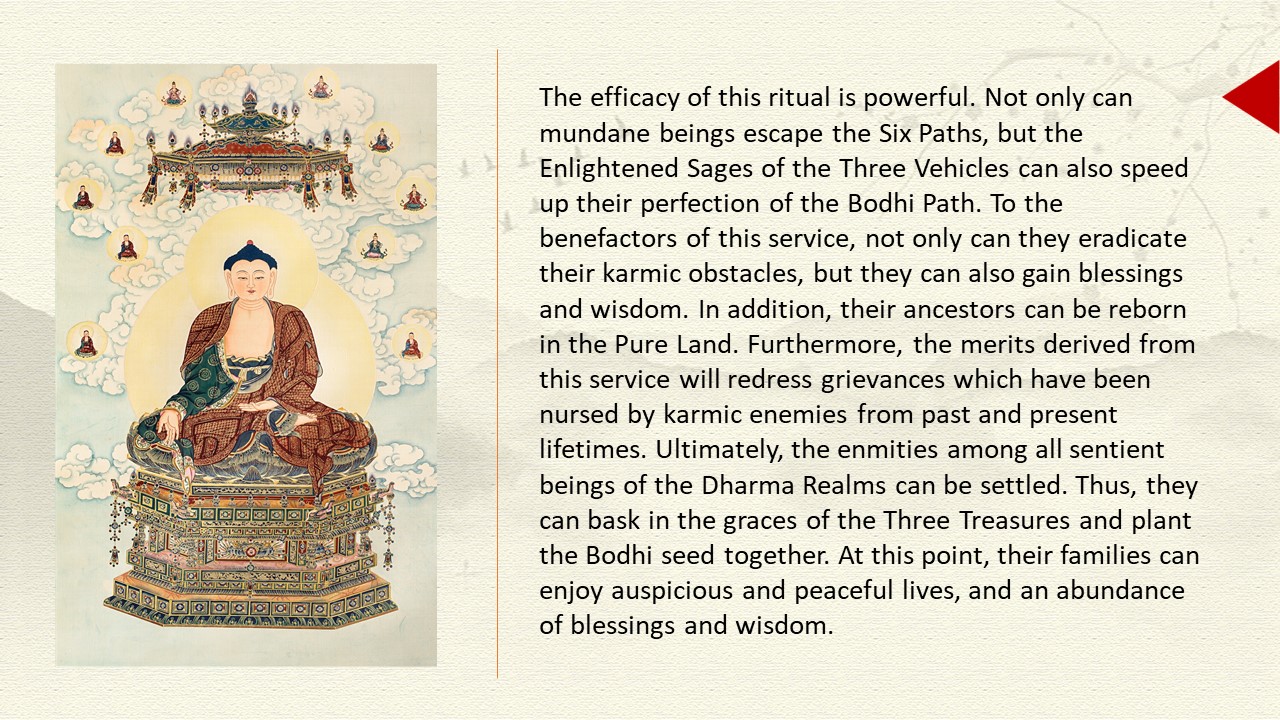
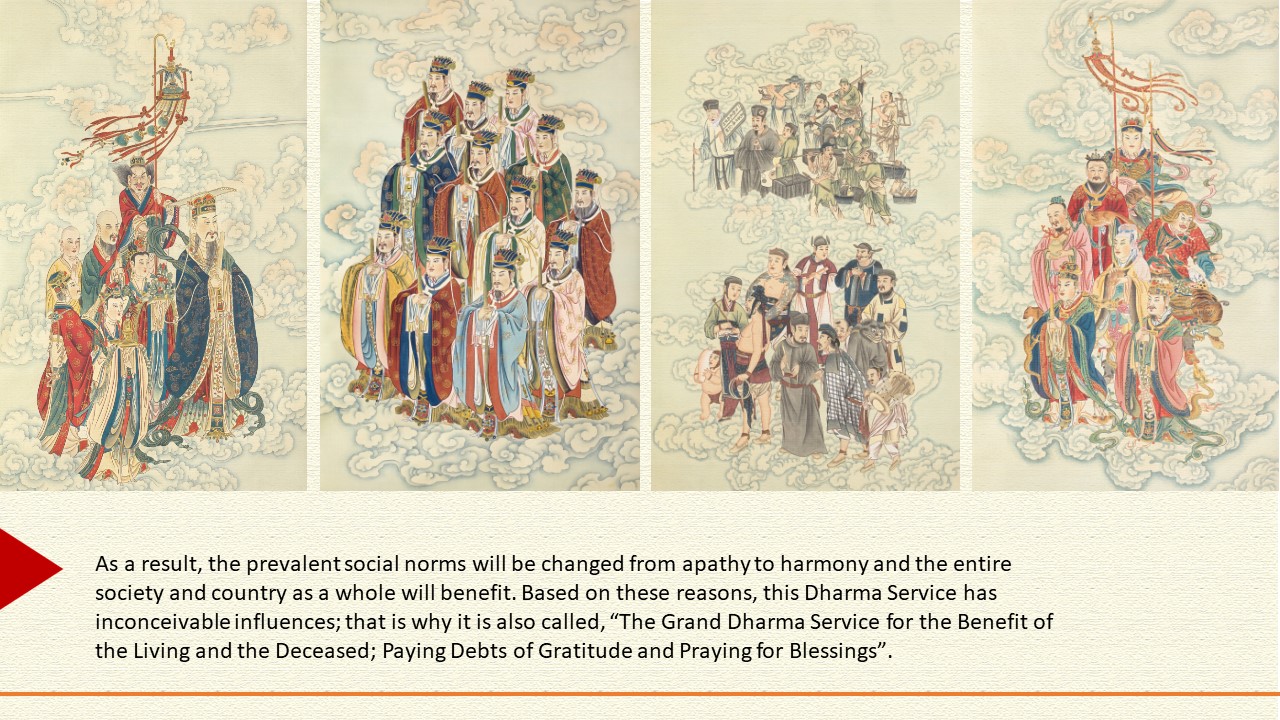
The full name of this Dharma Assembly is Water and Land Grand Dharma Service and Universal Offering to All Sagely and Ordinary Beings of the Entire Dharma Realm. The purpose of this ritual is to liberate deceased beings of the air, water and land through grand meal offerings. Through the power of the mantra, their long-term hunger and thirst will be alleviated. Thus, this ritual is also called Grand Offering of Universal Deliverance. To achieve its goal, an Inner Hall and an Outer Hall will be erected respectively during the Dharma Assembly. While food offerings are the primary purpose of the Inner Hall, the Outer Hall will serve as a center of Dharma offerings where sutra recitation, bowing in repentance, Buddha recitation, etc. take place so that sentient beings from the Lower Realms can have the opportunity to listen to the Buddhadharma while savoring a feast of delicious food. Subsequently, their innate nature will be revealed and their ignorance will be eliminated, resulting in their liberation. Through the power of the Buddhadharma, they will be freed from sufferings and attain happiness upon being reborn in the Western Pure Land.
As it is said, “When a holy grace can be widely elicited, there must be a great deal of effort devoted beforehand; to culminate a Dharma Assembly successfully, building its Dharma power in advance is a must.” Therefore, Buddhist sutras will be chanted in the Outer Hall prior to the start of the service. After that, the assembly of enlightened sages will be invited and the ritual of “Setting of the Boundaries” in the Inner Hall will then be held. The Inner Hall is the heart of the entire ritual, and all activities of liberation and blessing of all sentient beings are centered here. In order to ensure that all Dharma services can proceed without any disruptions, a boundary line will be drawn at this hall. The agenda of the service is shown as follows:
The First Day: The ritual of “Setting of the Boundaries” will be performed in the morning, so that the body and mind of all participants and the space throughout the Temple will be pure. Meanwhile, heavenly deities are pledged to guard various altar sites against disturbances from all intruders of evil spirits and heretics. The ritual of “Sending Invitations and Hanging Banners” will be held in the afternoon, during which the commencement of this Dharma Assembly is officially announced by earnestly inviting all sentient beings from various realms. The ritual of “Sending Invitations and Hanging Banners” is to deliver the invitations, through messengers, to all beings of the Four Realms of Enlightened Sages, as well as the Six Unenlightened Realms, for their honorable presence. To guide them to find their bearings, the Temple will raise a proclamation banner in the in the daytime and hang lanterns at night to make sure that the site is conspicuous.
The Second Day: The ritual of “Inviting the Upper Hall” will be scheduled in the morning, during which all Buddhas, Bodhisattvas, and the assembly of enlightened sages will be earnestly invited to accept the benefactors’ sincere offerings. With utmost reverence and humility, all benefactors will pray that the sages of the Upper Hall will bestow blessings on them and liberate their past ancestors.
The Third Day: “Offering to the Upper Hall” Ceremony will be held in the morning, during which the best offerings are proffered to the beings of Upper Hall. Offerings of clothing and food, incense, flowers, lamps, jewels and sutras (clothing and food are considered as one offering) are involved; thus it is named, “The six sorts of superb offerings.” All benefactors make this offering with their full sincerity and reverence; they offer even their favorite objects to the Buddhas. The ritual of “Sending Requests for Pardoning” will be performed in the afternoon, during which the Lord of Brahma Heaven and Trayastrimsa Heaven (also referred to as the Jade Emperor in Taoism) is beseeched for amnesty on behalf of the beings in the Hell Realm through burning a horse effigy in order to deliver a celestial petition. Through this ritual, even hell-dwellers who carry heavy karmic offenses can also be granted an invitation to join this service. Being indebted to the celestial deities, a grand feast offering will be held early next morning on behalf of all benefactors.
The Fourth Day: The ritual of “Inviting the Lower Hall” will be slated today, in which we will show our appreciation for the Buddha’s compassion, our sympathy towards the beings of the Six Paths, and our filial affection towards the ancestors of all benefactors. To take advantage of the presence of these Lower Hall beings, transmitting the Precepts for the Deceased will be held at night. Abiding by these Precepts, they will cleanse their past karmic offenses, purify their bad habitual tendencies, and not commit unwholesome deeds again.
The Fifth Day: The ritual of “Offering to the Lower Hall” will be scheduled for today since all beings of the Six Paths are now cleansed and able to sit within the Hall and savor the flavor of the Dharma. Apart from the offerings of luscious vegetarian foods, which include various kinds of dishes, broths, rice, pasta, fruits and pastries, they are also proffered with the same wonderful offerings as the beings of higher realms. After savoring all these offerings, they delightfully rejoice with full satisfaction and contentment.
The Sixth Day: Being content on this occasion of a rarely held ritual which is difficult to encounter, afflicted beings who are trapped in the Six Paths should grasp this opportunity to free themselves from drowning in the sea of suffering. Thus, the “Thrice Attentive Chanting Service” will be held today to recite the Amitabha Sutra and invoke Amitabha Buddha’s name to ensure their rebirth in the Pure Land.
The Seventh Day: The Dharma Service is about to end, so the last rituals of “Offering of Completion” and “Incense Offerings of Completion” will mark the successful culmination of this event. All sentient beings of the Six Paths are cordially invited to enjoy the offerings. Also, they are tirelessly admonished to initiate their orthodox faith, take refuge in the Three Treasures, bow in repentance and make the Four Universal Vows, so that they can be freed from the sea of suffering forever. The ritual of “Sending Off the Judges” will be held at noon, during which all the merits derived from this entire service will be delivered to the judges for inspection and acceptance. The ritual of “Sending Off the Sages” will be held in the afternoon to lower the curtains on this extraordinary Dharma Service. A sense of exhilaration and jubilation fill the monastery as a long procession with incense, flowers, lamps and streamers circumambulate to send off the assembly of enlightened sages. At this very moment, they are pled to frequently bring forth their compassionate mind, without forsaking their past vows, to propagate the Buddhadharma and save all sentient beings throughout the infinite future. Meanwhile, every single being of the Six Paths as well as every deceased loved one of the benefactors will be escorted to be reborn in the Pure Land.
During this week-long service, all benefactors will have participated with extreme sincerity and reverence without slacking off; the presiding masters will have vigilantly chanted, contemplated and practiced in accordance with the liturgy text; all meal offerings will have been sumptuous and all rituals solemn. Moreover, all Mahayana Buddhist sutras recited are the monumental ones which are rarely chanted. This service stands out from others in terms of meticulousness and extravagance. Therefore, the efficacy of this ritual is powerful. Not only can mundane beings escape the Six Paths, but the Enlightened Sages of the Three Vehicles can also speed up their perfection of the Bodhi Path. To the benefactors of this service, not only can they eradicate their karmic obstacles, but they can also gain blessings and wisdom. In addition, their ancestors can be reborn in the Pure Land. Furthermore, the merits derived from this service will redress grievances which have been nursed by karmic enemies from past and present lifetimes. Ultimately, the enmities among all sentient beings of the Dharma Realms can be settled. Thus, they can bask in the graces of the Three Treasures and plant the Bodhi seed together. At this point, their families can enjoy auspicious and peaceful lives, and an abundance of blessings and wisdom. As a result, the prevalent social norms will be changed from apathy to harmony and the entire society and country as a whole will benefit. Based on these reasons, this Dharma Service has inconceivable influences; that is why it is also called, “The Grand Dharma Service for the Benefit of the Living and the Deceased; Paying Debts of Gratitude and Praying for Blessings”.























 The full name of this Dharma Assembly is Water and Land Grand Dharma Service and Universal Offering to All Sagely and Ordinary Beings of the Entire Dharma Realm. The purpose of this ritual is to liberate deceased beings of the air, water and land through grand meal offerings. Through the power of the mantra, their long-term hunger and thirst will be alleviated. Thus, this ritual is also called Grand Offering of Universal Deliverance. To achieve its goal, an Inner Hall and an Outer Hall will be erected respectively during the Dharma Assembly. While food offerings are the primary purpose of the Inner Hall, the Outer Hall will serve as a center of Dharma offerings where sutra recitation, bowing in repentance, Buddha recitation, etc. take place so that sentient beings from the Lower Realms can have the opportunity to listen to the Buddhadharma while savoring a feast of delicious food. Subsequently, their innate nature will be revealed and their ignorance will be eliminated, resulting in their liberation. Through the power of the Buddhadharma, they will be freed from sufferings and attain happiness upon being reborn in the Western Pure Land.
As it is said, “When a holy grace can be widely elicited, there must be a great deal of effort devoted beforehand; to culminate a Dharma Assembly successfully, building its Dharma power in advance is a must.” Therefore, Buddhist sutras will be chanted in the Outer Hall prior to the start of the service. After that, the assembly of enlightened sages will be invited and the ritual of “Setting of the Boundaries” in the Inner Hall will then be held. The Inner Hall is the heart of the entire ritual, and all activities of liberation and blessing of all sentient beings are centered here. In order to ensure that all Dharma services can proceed without any disruptions, a boundary line will be drawn at this hall. The agenda of the service is shown as follows:
The First Day: The ritual of “Setting of the Boundaries” will be performed in the morning, so that the body and mind of all participants and the space throughout the Temple will be pure. Meanwhile, heavenly deities are pledged to guard various altar sites against disturbances from all intruders of evil spirits and heretics. The ritual of “Sending Invitations and Hanging Banners” will be held in the afternoon, during which the commencement of this Dharma Assembly is officially announced by earnestly inviting all sentient beings from various realms. The ritual of “Sending Invitations and Hanging Banners” is to deliver the invitations, through messengers, to all beings of the Four Realms of Enlightened Sages, as well as the Six Unenlightened Realms, for their honorable presence. To guide them to find their bearings, the Temple will raise a proclamation banner in the in the daytime and hang lanterns at night to make sure that the site is conspicuous.
The Second Day: The ritual of “Inviting the Upper Hall” will be scheduled in the morning, during which all Buddhas, Bodhisattvas, and the assembly of enlightened sages will be earnestly invited to accept the benefactors’ sincere offerings. With utmost reverence and humility, all benefactors will pray that the sages of the Upper Hall will bestow blessings on them and liberate their past ancestors.
The Third Day: “Offering to the Upper Hall” Ceremony will be held in the morning, during which the best offerings are proffered to the beings of Upper Hall. Offerings of clothing and food, incense, flowers, lamps, jewels and sutras (clothing and food are considered as one offering) are involved; thus it is named, “The six sorts of superb offerings.” All benefactors make this offering with their full sincerity and reverence; they offer even their favorite objects to the Buddhas. The ritual of “Sending Requests for Pardoning” will be performed in the afternoon, during which the Lord of Brahma Heaven and Trayastrimsa Heaven (also referred to as the Jade Emperor in Taoism) is beseeched for amnesty on behalf of the beings in the Hell Realm through burning a horse effigy in order to deliver a celestial petition. Through this ritual, even hell-dwellers who carry heavy karmic offenses can also be granted an invitation to join this service. Being indebted to the celestial deities, a grand feast offering will be held early next morning on behalf of all benefactors.
The Fourth Day: The ritual of “Inviting the Lower Hall” will be slated today, in which we will show our appreciation for the Buddha’s compassion, our sympathy towards the beings of the Six Paths, and our filial affection towards the ancestors of all benefactors. To take advantage of the presence of these Lower Hall beings, transmitting the Precepts for the Deceased will be held at night. Abiding by these Precepts, they will cleanse their past karmic offenses, purify their bad habitual tendencies, and not commit unwholesome deeds again.
The Fifth Day: The ritual of “Offering to the Lower Hall” will be scheduled for today since all beings of the Six Paths are now cleansed and able to sit within the Hall and savor the flavor of the Dharma. Apart from the offerings of luscious vegetarian foods, which include various kinds of dishes, broths, rice, pasta, fruits and pastries, they are also proffered with the same wonderful offerings as the beings of higher realms. After savoring all these offerings, they delightfully rejoice with full satisfaction and contentment.
The Sixth Day: Being content on this occasion of a rarely held ritual which is difficult to encounter, afflicted beings who are trapped in the Six Paths should grasp this opportunity to free themselves from drowning in the sea of suffering. Thus, the “Thrice Attentive Chanting Service” will be held today to recite the Amitabha Sutra and invoke Amitabha Buddha’s name to ensure their rebirth in the Pure Land.
The Seventh Day: The Dharma Service is about to end, so the last rituals of “Offering of Completion” and “Incense Offerings of Completion” will mark the successful culmination of this event. All sentient beings of the Six Paths are cordially invited to enjoy the offerings. Also, they are tirelessly admonished to initiate their orthodox faith, take refuge in the Three Treasures, bow in repentance and make the Four Universal Vows, so that they can be freed from the sea of suffering forever. The ritual of “Sending Off the Judges” will be held at noon, during which all the merits derived from this entire service will be delivered to the judges for inspection and acceptance. The ritual of “Sending Off the Sages” will be held in the afternoon to lower the curtains on this extraordinary Dharma Service. A sense of exhilaration and jubilation fill the monastery as a long procession with incense, flowers, lamps and streamers circumambulate to send off the assembly of enlightened sages. At this very moment, they are pled to frequently bring forth their compassionate mind, without forsaking their past vows, to propagate the Buddhadharma and save all sentient beings throughout the infinite future. Meanwhile, every single being of the Six Paths as well as every deceased loved one of the benefactors will be escorted to be reborn in the Pure Land.
During this week-long service, all benefactors will have participated with extreme sincerity and reverence without slacking off; the presiding masters will have vigilantly chanted, contemplated and practiced in accordance with the liturgy text; all meal offerings will have been sumptuous and all rituals solemn. Moreover, all Mahayana Buddhist sutras recited are the monumental ones which are rarely chanted. This service stands out from others in terms of meticulousness and extravagance. Therefore, the efficacy of this ritual is powerful. Not only can mundane beings escape the Six Paths, but the Enlightened Sages of the Three Vehicles can also speed up their perfection of the Bodhi Path. To the benefactors of this service, not only can they eradicate their karmic obstacles, but they can also gain blessings and wisdom. In addition, their ancestors can be reborn in the Pure Land. Furthermore, the merits derived from this service will redress grievances which have been nursed by karmic enemies from past and present lifetimes. Ultimately, the enmities among all sentient beings of the Dharma Realms can be settled. Thus, they can bask in the graces of the Three Treasures and plant the Bodhi seed together. At this point, their families can enjoy auspicious and peaceful lives, and an abundance of blessings and wisdom. As a result, the prevalent social norms will be changed from apathy to harmony and the entire society and country as a whole will benefit. Based on these reasons, this Dharma Service has inconceivable influences; that is why it is also called, “The Grand Dharma Service for the Benefit of the Living and the Deceased; Paying Debts of Gratitude and Praying for Blessings”.
The full name of this Dharma Assembly is Water and Land Grand Dharma Service and Universal Offering to All Sagely and Ordinary Beings of the Entire Dharma Realm. The purpose of this ritual is to liberate deceased beings of the air, water and land through grand meal offerings. Through the power of the mantra, their long-term hunger and thirst will be alleviated. Thus, this ritual is also called Grand Offering of Universal Deliverance. To achieve its goal, an Inner Hall and an Outer Hall will be erected respectively during the Dharma Assembly. While food offerings are the primary purpose of the Inner Hall, the Outer Hall will serve as a center of Dharma offerings where sutra recitation, bowing in repentance, Buddha recitation, etc. take place so that sentient beings from the Lower Realms can have the opportunity to listen to the Buddhadharma while savoring a feast of delicious food. Subsequently, their innate nature will be revealed and their ignorance will be eliminated, resulting in their liberation. Through the power of the Buddhadharma, they will be freed from sufferings and attain happiness upon being reborn in the Western Pure Land.
As it is said, “When a holy grace can be widely elicited, there must be a great deal of effort devoted beforehand; to culminate a Dharma Assembly successfully, building its Dharma power in advance is a must.” Therefore, Buddhist sutras will be chanted in the Outer Hall prior to the start of the service. After that, the assembly of enlightened sages will be invited and the ritual of “Setting of the Boundaries” in the Inner Hall will then be held. The Inner Hall is the heart of the entire ritual, and all activities of liberation and blessing of all sentient beings are centered here. In order to ensure that all Dharma services can proceed without any disruptions, a boundary line will be drawn at this hall. The agenda of the service is shown as follows:
The First Day: The ritual of “Setting of the Boundaries” will be performed in the morning, so that the body and mind of all participants and the space throughout the Temple will be pure. Meanwhile, heavenly deities are pledged to guard various altar sites against disturbances from all intruders of evil spirits and heretics. The ritual of “Sending Invitations and Hanging Banners” will be held in the afternoon, during which the commencement of this Dharma Assembly is officially announced by earnestly inviting all sentient beings from various realms. The ritual of “Sending Invitations and Hanging Banners” is to deliver the invitations, through messengers, to all beings of the Four Realms of Enlightened Sages, as well as the Six Unenlightened Realms, for their honorable presence. To guide them to find their bearings, the Temple will raise a proclamation banner in the in the daytime and hang lanterns at night to make sure that the site is conspicuous.
The Second Day: The ritual of “Inviting the Upper Hall” will be scheduled in the morning, during which all Buddhas, Bodhisattvas, and the assembly of enlightened sages will be earnestly invited to accept the benefactors’ sincere offerings. With utmost reverence and humility, all benefactors will pray that the sages of the Upper Hall will bestow blessings on them and liberate their past ancestors.
The Third Day: “Offering to the Upper Hall” Ceremony will be held in the morning, during which the best offerings are proffered to the beings of Upper Hall. Offerings of clothing and food, incense, flowers, lamps, jewels and sutras (clothing and food are considered as one offering) are involved; thus it is named, “The six sorts of superb offerings.” All benefactors make this offering with their full sincerity and reverence; they offer even their favorite objects to the Buddhas. The ritual of “Sending Requests for Pardoning” will be performed in the afternoon, during which the Lord of Brahma Heaven and Trayastrimsa Heaven (also referred to as the Jade Emperor in Taoism) is beseeched for amnesty on behalf of the beings in the Hell Realm through burning a horse effigy in order to deliver a celestial petition. Through this ritual, even hell-dwellers who carry heavy karmic offenses can also be granted an invitation to join this service. Being indebted to the celestial deities, a grand feast offering will be held early next morning on behalf of all benefactors.
The Fourth Day: The ritual of “Inviting the Lower Hall” will be slated today, in which we will show our appreciation for the Buddha’s compassion, our sympathy towards the beings of the Six Paths, and our filial affection towards the ancestors of all benefactors. To take advantage of the presence of these Lower Hall beings, transmitting the Precepts for the Deceased will be held at night. Abiding by these Precepts, they will cleanse their past karmic offenses, purify their bad habitual tendencies, and not commit unwholesome deeds again.
The Fifth Day: The ritual of “Offering to the Lower Hall” will be scheduled for today since all beings of the Six Paths are now cleansed and able to sit within the Hall and savor the flavor of the Dharma. Apart from the offerings of luscious vegetarian foods, which include various kinds of dishes, broths, rice, pasta, fruits and pastries, they are also proffered with the same wonderful offerings as the beings of higher realms. After savoring all these offerings, they delightfully rejoice with full satisfaction and contentment.
The Sixth Day: Being content on this occasion of a rarely held ritual which is difficult to encounter, afflicted beings who are trapped in the Six Paths should grasp this opportunity to free themselves from drowning in the sea of suffering. Thus, the “Thrice Attentive Chanting Service” will be held today to recite the Amitabha Sutra and invoke Amitabha Buddha’s name to ensure their rebirth in the Pure Land.
The Seventh Day: The Dharma Service is about to end, so the last rituals of “Offering of Completion” and “Incense Offerings of Completion” will mark the successful culmination of this event. All sentient beings of the Six Paths are cordially invited to enjoy the offerings. Also, they are tirelessly admonished to initiate their orthodox faith, take refuge in the Three Treasures, bow in repentance and make the Four Universal Vows, so that they can be freed from the sea of suffering forever. The ritual of “Sending Off the Judges” will be held at noon, during which all the merits derived from this entire service will be delivered to the judges for inspection and acceptance. The ritual of “Sending Off the Sages” will be held in the afternoon to lower the curtains on this extraordinary Dharma Service. A sense of exhilaration and jubilation fill the monastery as a long procession with incense, flowers, lamps and streamers circumambulate to send off the assembly of enlightened sages. At this very moment, they are pled to frequently bring forth their compassionate mind, without forsaking their past vows, to propagate the Buddhadharma and save all sentient beings throughout the infinite future. Meanwhile, every single being of the Six Paths as well as every deceased loved one of the benefactors will be escorted to be reborn in the Pure Land.
During this week-long service, all benefactors will have participated with extreme sincerity and reverence without slacking off; the presiding masters will have vigilantly chanted, contemplated and practiced in accordance with the liturgy text; all meal offerings will have been sumptuous and all rituals solemn. Moreover, all Mahayana Buddhist sutras recited are the monumental ones which are rarely chanted. This service stands out from others in terms of meticulousness and extravagance. Therefore, the efficacy of this ritual is powerful. Not only can mundane beings escape the Six Paths, but the Enlightened Sages of the Three Vehicles can also speed up their perfection of the Bodhi Path. To the benefactors of this service, not only can they eradicate their karmic obstacles, but they can also gain blessings and wisdom. In addition, their ancestors can be reborn in the Pure Land. Furthermore, the merits derived from this service will redress grievances which have been nursed by karmic enemies from past and present lifetimes. Ultimately, the enmities among all sentient beings of the Dharma Realms can be settled. Thus, they can bask in the graces of the Three Treasures and plant the Bodhi seed together. At this point, their families can enjoy auspicious and peaceful lives, and an abundance of blessings and wisdom. As a result, the prevalent social norms will be changed from apathy to harmony and the entire society and country as a whole will benefit. Based on these reasons, this Dharma Service has inconceivable influences; that is why it is also called, “The Grand Dharma Service for the Benefit of the Living and the Deceased; Paying Debts of Gratitude and Praying for Blessings”.
